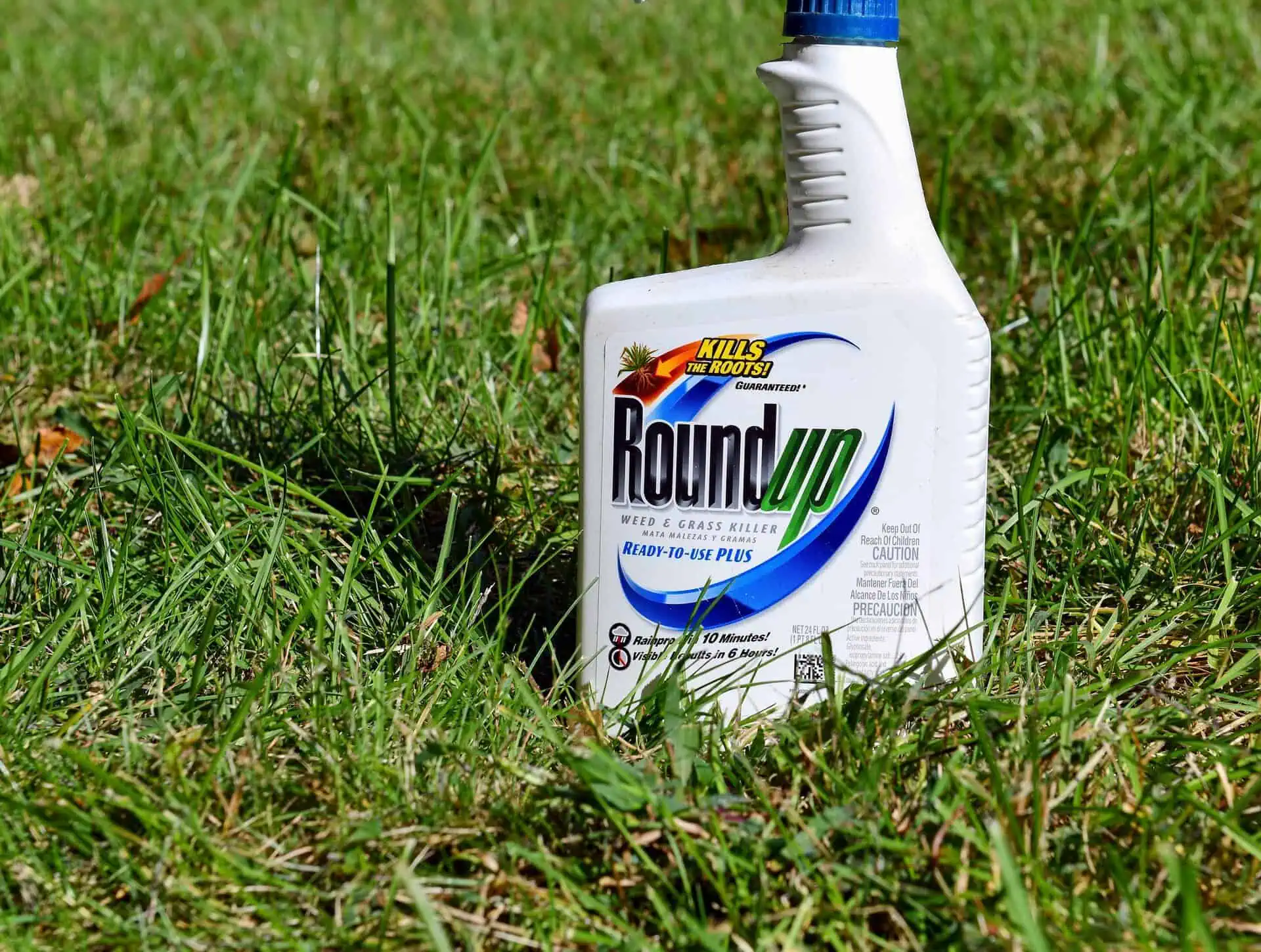Roundup Side Effects | Roundup Weed Killer Side Effects
- Last Updated: June 12th, 2025

Attorney Jessica Paluch-Hoerman, founder of TruLaw, has over 28 years of experience as a personal injury and mass tort attorney, and previously worked as an international tax attorney at Deloitte. Jessie collaborates with attorneys nationwide — enabling her to share reliable, up-to-date legal information with our readers.
Legally Reviewed
This article has been written and reviewed for legal accuracy and clarity by the team of writers and legal experts at TruLaw and is as accurate as possible. This content should not be taken as legal advice from an attorney. If you would like to learn more about our owner and experienced injury lawyer, Jessie Paluch, you can do so here.
Fact-Checked
TruLaw does everything possible to make sure the information in this article is up to date and accurate. If you need specific legal advice about your case, contact us by using the chat on the bottom of this page. This article should not be taken as advice from an attorney.
Roundup Side Effects
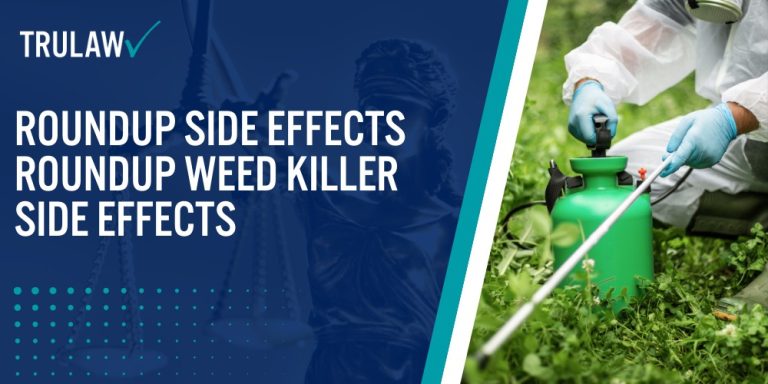
A March 2015 review of the weed killer conducted by the World Health Organization’s International Agency for Research on Cancer (IARC) and published in March 2015 in the International Journal of Environmental Research and Public Health stated that glyphosate (brand name Roundup) is “probably carcinogenic.”
Table of Contents
Is Roundup Safe?
Glyphosate is not included in the U.S. government’s testing of food for pesticide residues or the monitoring of chemicals in human blood and tissues, so there is no information available regarding how much people are actually exposed to it from yard use, living near farms, or eating foods from treated fields.
A recent USGS study sampled the waterways in 38 states and found glyphosate in the majority of rivers, streams, ditches, and wastewater treatment plant outfalls tested.
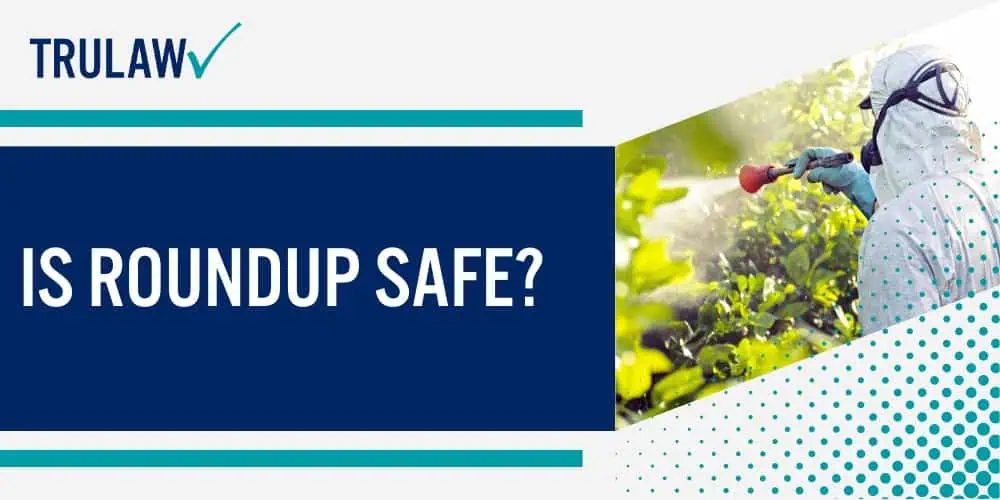
Roundup is the most used herbicide in the world and Monsanto continues to insist that it is safe and does not cause cancer.
The company has spent the last two decades genetically re-engineering corn, soybeans, and cotton so it is easier to spray the crops with the weed killer.
According to a New York Times report, approximately 220 million pounds of glyphosate were used in 2015 in the U.S. alone.
However, multiple scientific studies in the United States and worldwide have linked exposure to glyphosate to cancer:
- A 1999 study published in the journal Cancer found an increased risk for non-Hodgkin lymphoma (NHL) among subjects exposed to herbicides such as Roundup.
- The Environmental Protection Agency (EPA) has previously found that glyphosate does not pose a cancer risk to humans, but is currently in the process of evaluating it as standard procedure for chemicals every 15 years. The review is expected to be completed soon, and will take the IARC report into consideration, experts say.
- According to a June 2016 review conducted by independent scientists, glyphosate acts as a glycine equivalent that incorporates into peptides during protein synthesis and during this process, alters a number of proteins that depend on conserved glycine for proper function. The researchers linked glyphosate substitution for glycine with several diseases, including diabetes, obesity, asthma, Alzheimer’s disease, amyotrophic lateral sclerosis (ALS), and Parkinson’s disease, among others.
In March 2017, a federal court unsealed documents raising questions about the safety of Roundup and the research practices of Monsanto.
The documents included Monsanto’s internal emails and email traffic between the company and federal regulators that suggested that Monsanto had ghostwritten research that was later attributed to academics, and indicated that a senior official at the EPA had worked to cancel a review of glyphosate that was to have been conducted by the U.S. Department of Health and Human Services.
The documents also indicated that there was disagreement within the EPA over the actual safety of Roundup.
Roundup Side Effects
According to EcoWatch, 20 years of intensifying exposure to Roundup through the water that we drink, the air we breathe and the food that we eat.
This exposure has led to increased health consequences that have been documented by a number of scientists.
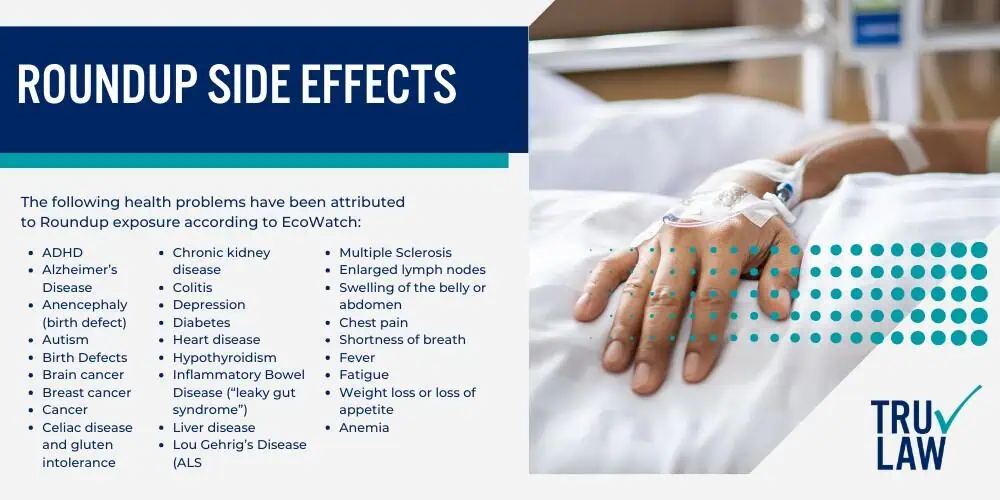
The following health problems have been attributed to Roundup exposure according to EcoWatch:
- ADHD
- Alzheimer’s Disease
- Anencephaly (birth defect)
- Autism
- Birth Defects
- Brain cancer
- Breast cancer
- Cancer
- Celiac disease and gluten intolerance
- Chronic kidney disease
- Colitis
- Depression
- Diabetes
- Heart disease
- Hypothyroidism
- Inflammatory Bowel Disease (“leaky gut syndrome”)
- Liver disease
- Lou Gehrig’s Disease (ALS)
- Multiple Sclerosis
- Enlarged lymph nodes
- Swelling of the belly or abdomen
- Chest pain
- Shortness of breath
- Fever
- Fatigue
- Weight loss or loss of appetite
- Anemia
Roundup and Herbicide Cancer
The main ingredient in Roundup is glyphosate, an herbicide that kills broadleaf plants and grasses when applied to the leaves of the plants.
According to the report, glyphosate is “probably carcinogenic,” caused cancer in lab tests on animals, and damaged DNA in human cells.
But the Environmental Protection Agency (EPA) has previously found that glyphosate does not pose a cancer risk to humans, but is currently in the process of evaluating it as standard procedure for chemicals every 15 years.
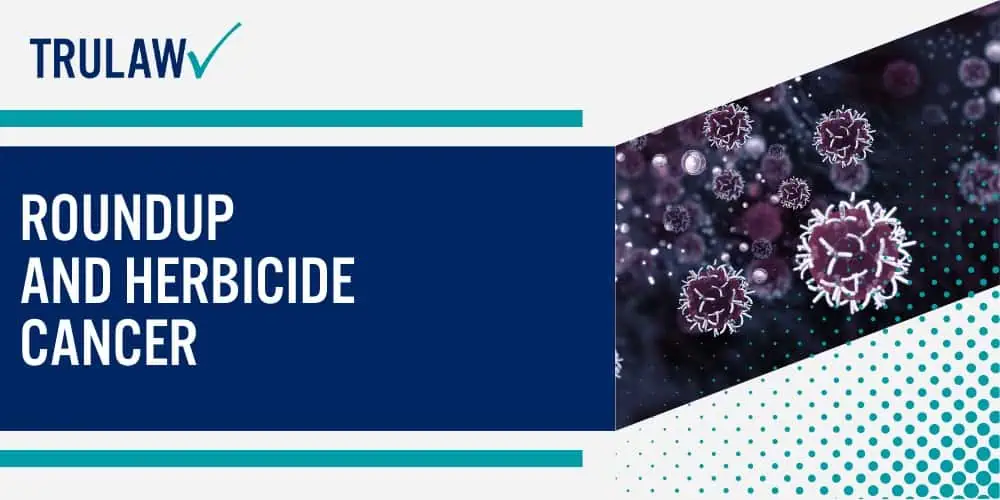
The review is expected to be completed by the end of this year, and will take the IARC report into consideration, experts say.
The reason the EPA and IARC have conflicting reports about the safety of glyphosate may involve their approach to research.
While IARC focuses on hazard identification, the EPA focuses on risk.
But identifying risk is a more involved process:
To demonstrate risk, the EPA requires evidence that glyphosate not only causes cancer but that it’s likely to cause cancer under specific conditions.

Managing Attorney & Owner
With over 25 years of legal experience, Jessica Paluch-Hoerman is an Illinois lawyer, a CPA, and a mother of three. She spent the first decade of her career working as an international tax attorney at Deloitte.
In 2009, Jessie co-founded her own law firm with her husband – which has scaled to over 30 employees since its conception.
In 2016, Jessie founded TruLaw, which allows her to collaborate with attorneys and legal experts across the United States on a daily basis. This hypervaluable network of experts is what enables her to share the most reliable, accurate, and up-to-date legal information with our readers!
Additional Roundup Lawsuit resources on our website:
Here, at TruLaw, we’re committed to helping victims get the justice they deserve.
Alongside our partner law firms, we have successfully collected over $3 Billion in verdicts and settlements on behalf of injured individuals.
Would you like our help?
At TruLaw, we fiercely combat corporations that endanger individuals’ well-being. If you’ve suffered injuries and believe these well-funded entities should be held accountable, we’re here for you.
With TruLaw, you gain access to successful and seasoned lawyers who maximize your chances of success. Our lawyers invest in you—they do not receive a dime until your lawsuit reaches a successful resolution!
AFFF Lawsuit claims are being filed against manufacturers of aqueous film-forming foam (AFFF), commonly used in firefighting.
Claims allege that companies such as 3M, DuPont, and Tyco Fire Products failed to adequately warn users about the potential dangers of AFFF exposure — including increased risks of various cancers and diseases.
Depo Provera Lawsuit claims are being filed by individuals who allege they developed meningioma (a type of brain tumor) after receiving Depo-Provera birth control injections.
A 2024 study found that women using Depo-Provera for at least 1 year are five times more likely to develop meningioma brain tumors compared to those not using the drug.
Suboxone Tooth Decay Lawsuit claims are being filed against Indivior, the manufacturer of Suboxone, a medication used to treat opioid addiction.
Claims allege that Indivior failed to adequately warn users about the potential dangers of severe tooth decay and dental injuries associated with Suboxone’s sublingual film version.
Social Media Harm Lawsuits are being filed against social media companies for allegedly causing mental health issues in children and teens.
Claims allege that companies like Meta, Google, ByteDance, and Snap designed addictive platforms that led to anxiety, depression, and other mental health issues without adequately warning users or parents.
Transvaginal Mesh Lawsuits are being filed against manufacturers of transvaginal mesh products used to treat pelvic organ prolapse (POP) and stress urinary incontinence (SUI).
Claims allege that companies like Ethicon, C.R. Bard, and Boston Scientific failed to adequately warn about potential dangers — including erosion, pain, and infection.
Bair Hugger Warming Blanket Lawsuits involve claims against 3M — alleging their surgical warming blankets caused severe infections and complications (particularly in hip and knee replacement surgeries).
Plaintiffs claim 3M failed to warn about potential risks — despite knowing about increased risk of deep joint infections since 2011.
Baby Formula NEC Lawsuit claims are being filed against manufacturers of cow’s milk-based baby formula products.
Claims allege that companies like Abbott Laboratories (Similac) and Mead Johnson & Company (Enfamil) failed to warn about the increased risk of necrotizing enterocolitis (NEC) in premature infants.
Here, at TruLaw, we’re committed to helping victims get the justice they deserve.
Alongside our partner law firms, we have successfully collected over $3 Billion in verdicts and settlements on behalf of injured individuals.
Would you like our help?
